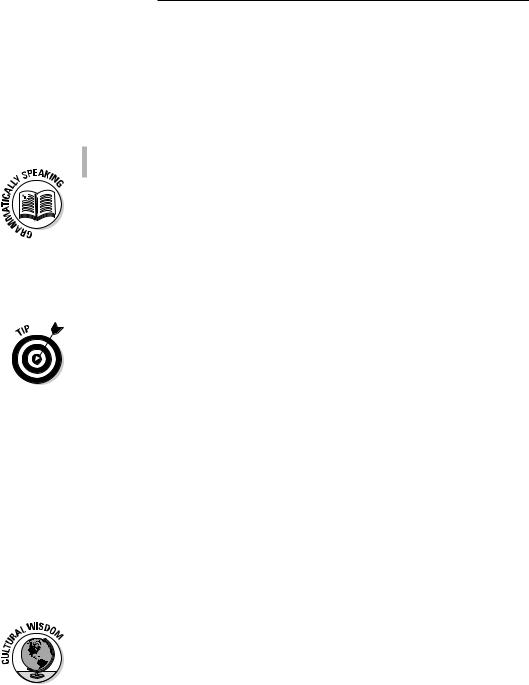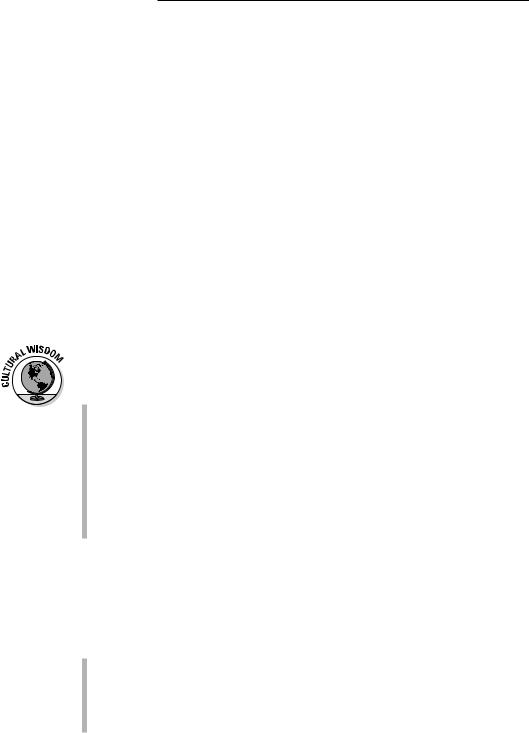
- •About the Authors
- •Dedication
- •Acknowledgments
- •Table of Contents
- •Introduction
- •About This Book
- •Conventions Used in This Book
- •Foolish Assumptions
- •How This Book Is Organized
- •Icons Used in This Book
- •Where to Go from Here
- •The French You’re Familiar With
- •Idioms and Popular Expressions
- •Key Parts of Speech
- •Cavorting with Verbs
- •Forming Sentences and Questions
- •The French Alphabet
- •Uttering Vowel and Consonant Sounds
- •Greetings: Formal and Friendly
- •Asking Questions to Get to Know People
- •Counting Your Lucky Stars: Numbers
- •Using the Calendar and Dates
- •Telling Time in French
- •Discussing Where You Live with the Verb “Habiter”
- •Discussing Daily Routine with Reflexive Verbs
- •Using Possessive Adjectives to Introduce Your Family Members
- •Basic Questions and Polite Expressions
- •Stating Your Preferences
- •Talking about Your Livelihood
- •Chatting about the Weather
- •Deciding to Keep in Touch
- •Getting Direction about Directions
- •Dining Out
- •Going to the Market
- •Going Shopping
- •Going Out with the Verb “Sortir”
- •Having Fun with the Verb “S’amuser”
- •Oh, the Places You’ll Go!
- •Making Plans with Friends
- •Making a Phone Call
- •Livin’ in the Past: Using the Past Tense
- •Playing Sports and Games
- •Going to the Beach
- •Setting Up Camp
- •Enjoying Quieter Pursuits
- •Where Do You Want to Go?
- •Getting Ready for Your Trip
- •Getting Current with Currency
- •Going to the Bank
- •Using Credit Cards and ATMs
- •Getting through the Airport
- •Navigating Buses, Trains, and Subways
- •Getting Around by Car
- •Finding Accommodations
- •Checking In to a Hotel
- •Checking Out of a Hotel
- •Getting Help Fast
- •Getting Medical Help
- •Handling Legal Matters
- •Label the Things in Your House
- •Write Your Shopping Lists in French
- •Listen to French Music
- •Watch French Movies
- •Tune in to TV5
- •Read French Publications
- •Take a Class
- •Join a French Association
- •Join an Online Chat or Pen Pal Forum
- •Using “Tu” When You Mean “Vous”
- •Using “Bonne nuit!” for Good-Bye
- •Using “Garçon” or “Porteur” to Address Service Staff
- •Saying “Je suis excité(e)” to Indicate Excitement
- •Saying “Je suis chaud(e)/froid(e)” to Say You’re Hot or Cold
- •Saying “Je suis plein/e” to Mean You’re Full
- •Using “de la glace” to Request Ice
- •Using “Je suis . . . ans” to Tell Your Age
- •Asking for Change with “J’ai besoin de change”
- •Using the Verb “Visiter” in Reference to People
- •“À mon avis”
- •“C’est pas vrai”
- •“Avec plaisir”
- •“C’est génial”
- •“À votre santé”
- •“À vos souhaits”
- •“Quelle horreur!”
- •“À bientôt”
- •“Passez-moi un coup de fil!”
- •“On y va!” or “Allons-y!”
- •“Je n’en sais rien”
- •“Je n’en reviens pas”
- •“Ça vaut la peine”
- •“C’est pas grave”
- •“N’importe”
- •“Tu cherches midi à 14h”
- •“Prenons un pot!”
- •Regular French Verbs
- •Auxiliary French Verbs
- •Track Listing
- •Customer Care
- •Index

58 |
Part I: Getting Started |
Approximating quantities
Sometimes you want to approximate the numbers instead of being very exact. If you were speculating on someone’s age, for example, you may say in English that she is or looks about 40. You can do the same in French by adding the suffix –aine (ehn) to the cardinal numbers. Here are some examples:
une dizaine (ewn deez-ehn) (about 10)
une vingtaine (ewn vaN-tehn) (about 20)
If a noun follows the approximate quantity, then add the preposition de (duh) or d’ if the noun begins with a vowel or a mute h, as these examples show:
Je voudrais une dizaine de croissants. (zhuh vooh-dreh ewn deez-ehn duh krwah-sahN.) (I would like about 10 croissants.)
Il y a une vingtaine d’étudiants dans la classe. (eel ee ah ewn vahN-tehn dey-tew-dyahN dahN lah klahs.) (There are about 20 students in the class.)
You can refer to approximate numbers by using the words à peu près (ah puh preh) or environ (ahN-vee-rohN), both of which mean approximately. For example, J’ai environ quatre-vingts livres dans mon bureau (zhey ahN-vee- rohN kah-truh-vaN lee-vruh dahN mohN bew-roh) (I have approximately 80 books in my office).
Using the Calendar and Dates
France, the United States, and many other countries around the world use a similar calendar, one that has seven days and twelve months. Yet countries differ in how the date is presented. In English, the month comes first, followed by the day of the month, followed by the year. In French, the day of the month comes first, followed by the month, followed by the year. For example, the date May 8, 2011 is presented like this in French: le 8 mai, 2011 (luh wee meh duh-meel-ohNz), and it’s written 8-5-2011. Imagine how funny (or embarrassing) it would be if you were invited to an important event on 8-5-2011 and you showed up on 5-8-2011 (August 5, 2011)!
Even though a week has seven days, the French refer to a week as huit jours (wee zhoohr) (8 days) and to two weeks as quinze jours (kaNz zhoohr)
(15 days). The reason is that if you count from Monday to Monday and you include both Mondays, then you have 8 days, and if you continue counting to the following Monday (the third Monday), you have 15 days.
www.ATIBOOK.ir

Chapter 4: Getting Your Numbers, Dates, and Times Straight |
59 |
Recounting the days of the week
The French calendar begins on a Monday as the first day of the week. Unlike English, the days of the week are not capitalized in French:
lundi (luhN-dee) (Monday)
mardi (mahr-dee) (Tuesday)
mercredi (mehr-kruh-dee) (Wednesday)
jeudi (zhuh-dee) (Thursday)
vendredi (vahN-druh-dee) (Friday)
samedi (sahm-dee) (Saturday)
dimanche (dee-mahNnsh) (Sunday)
When referring to a particular day, state the day without an article: je travaille samedi (zhuh trah-vahy sahm-dee) (I work [on] Saturday). But if you want to say I work on Saturdays, you have to place the definite article le (luh) (the) in front of the day of the week, like this: je travaille le samedi (zhuh trah-vahy luh sahm-dee) (I work on Saturdays). Placing the definite article le in front of the day(s) of the week is like adding an s to the day(s) of the week in English.
Knowing the names of the months
Just like the days of the week, the months of the year are not capitalized in French. Here are the months in French:
janvier (zhahN-vyey) (January)
février (fey-vryey) (February)
mars (mahrs) (March)
avril (ah-vreel) (April)
mai (meh) (May)
juin (zhwaN) (June)
juillet (zhwee-yeh) (July)
août (ooht) (August)
septembre (sehp-tahN-bruh) (September)
octobre (ohk-toh-bruh) (October)
novembre (noh-vahN-bruh) (November)
décembre (dey-sahN-bruh) (December)
To say that something is happening in a certain month, you use the preposition en (ahN) (in) in front of the month. Here are some examples:
www.ATIBOOK.ir

60 |
Part I: Getting Started |
Mon anniversaire est en décembre. (mohN-nah-nee-vehr-sehr eht-ahN dey-sahN-bruh.)(My birthday is in December.)
En janvier, je pars pour la Martinique. (ahN zhaN-vyey, zhuh pahr poohr lah mahr-tee-neek.) (In January, I leave for Martinique.)
Je reviens en avril. (zhuh ruh-vyaN ahN-nah-vreel). (I am coming back in April.)
Setting specific dates
When expressing a specific date, use the following construction:
Le + cardinal number + month + year
You use this formula to express all dates, except for the first of the month, when you use the ordinal number. Here are a couple of examples:
C’est le 6 avril 2000. (seh luh see-zah-vreel duh meel.) (It’s the sixth of April 2000.)
C’est le premier mai. (seh luh pruh-myey meh.) (It’s the first of May.)
The following are some important dates in some French-speaking countries:
le 14 juillet (luh kah-tohrz zhwee-yeh) (July14): The French national holiday
le premier août (luh pruh-myey ooht) (August 1): The Swiss national holiday
le 17 juillet (luh dee-seht zhwee-yeh) (July 17): The Belgian national holiday
le premier juillet (luh pruh-myey zhwee-yeh) (July 1): The Canadian national holiday
Remembering the seasons
The seasons in French are masculine and, unlike in English, require the definite article:
le printemps (luh praN-tahN) (spring)
l’été (ley-tey) (summer)
l’automne (loh-tohn) (fall)
l’hiver (lee-vehr) (winter)
www.ATIBOOK.ir

Chapter 4: Getting Your Numbers, Dates, and Times Straight |
61 |
To express in the spring, for example, use au (oh) before a consonant sound and use en (ahN) before a vowel sound: au printemps (oh praN-tahN) (in the spring), en été (ahN-ney-tey) (in the summer), en automne (ahN-noh-tohn) (in the fall), and en hiver (ahN-nee-vehr) (in the winter).
Talkin’ the Talk
Juliette is talking to her friend Corinne about her sister’s upcoming wedding.
Juliette: |
Ma soeur va se marier au printemps. |
|
mah suhr vah suh mah-ryey oh praN-tahN. |
|
My sister is getting married in the spring. |
Corinne: |
Ah oui. Quand exactement? |
|
ah wee. kahN-tehg-zah-ktuh-mahN? |
|
Oh yes. When exactly? |
Juliette: |
Le 6 avril. |
|
luh see-zah-vreel. |
|
April 6. |
Corinne: |
C’est quel jour? |
|
seh kehl zhoohr? |
|
What day is it? |
Juliette: |
C’est un samedi. |
|
seh-tuhN sahm-dee. |
|
It’s a Saturday. |
Corinne: |
À quelle heure est la cérémonie? |
|
ah kehl uhr eh lah sey-rey-moh-nee? |
|
What time is the ceremony? |
Juliette: |
À 11 heures. |
|
ah ohNz uhr. |
|
At 11:00 a.m. |
Corinne: |
Combien de personnes avez-vous invitées? |
|
kohN-byaN duh pehr-sohhn ah-vey-vooh-zaN-vee-tey? |
|
How many people did you invite? |
Juliette: |
Une centaine de personnes. |
|
ewn sahN-tehn duh pehr-sohhn. |
|
About a hundred people. |
|
|
www.ATIBOOK.ir
